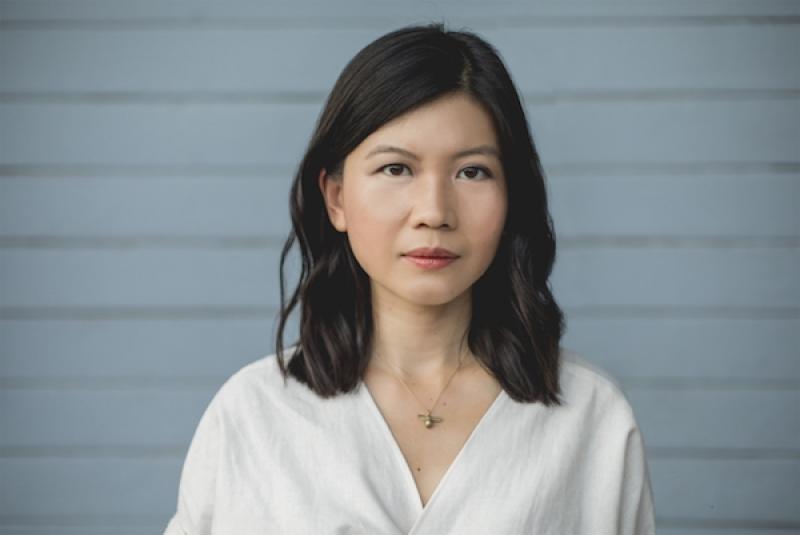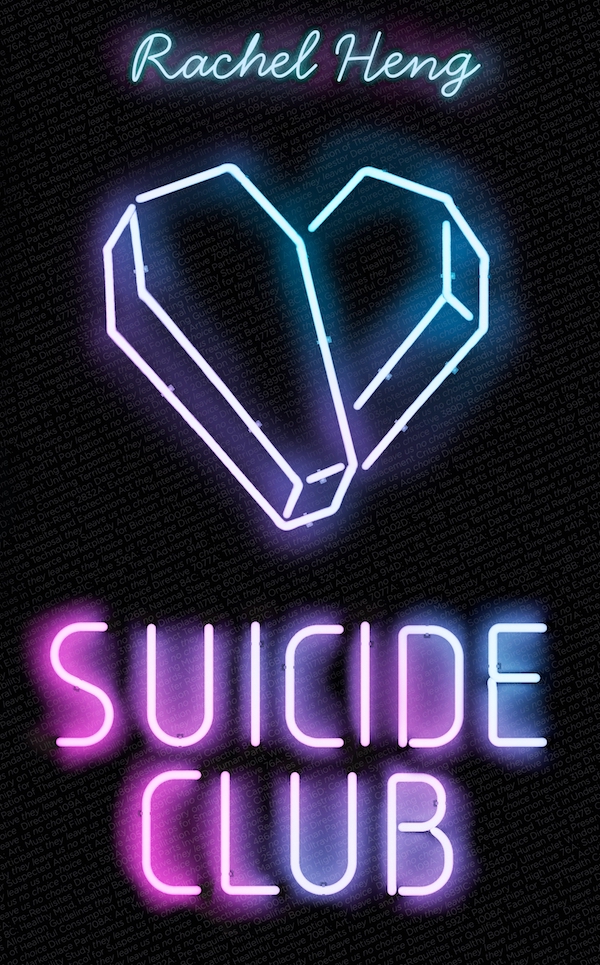Rachel Heng: Suicide Club review - skin-deep dystopia | reviews, news & interviews
Rachel Heng: Suicide Club review - skin-deep dystopia
Rachel Heng: Suicide Club review - skin-deep dystopia
In New York's near future, two women strive against the system

When Lea is nervous she picks at the skin near the nail of her thumb. When she draws blood the wound repairs instantly because she is a member of the Second Wave endowed with SmartBlood™ and DiamondSkin™. Aside from this tic she is an otherwise apparently perfect lifer in a future New York divided into those who may live up to three hundred and those who can merely hope to attain a hundred at most.
To be perfect is a matter of both appearance and being. Her genes predispose her towards longevity but to be eligible for the optimised life-enhancement benefits is a matter of behaviour: drink your virtuous cordial and enjoy your Nutripak meals, don’t prepare trad food too often, do your stretches, look out for wrinkles, and never, never eat meat. The appearance of happiness is happiness itself. Taking her mother’s counsel, when you smile, “make sure to use your eyes, or it looks like you don’t mean it.”
No cracks must be shown but the Third Wave is coming: immortality is in sight and to not love life is to be a person worthy of deep suspicion. While Lea has chosen a lifestyle which inures her to the presence of death, Anja is living right up close to it. With the integrational zeal of a new immigrant, her Swedish mother was one of the first to take up the early medical enhancements and now is the victim of misalignment. Her brain has died, and so has her skin which has become stickily transparent, but her heart still pumps. Until it stops, her artificial corporeal adjustments keep her alive. Anja visits every day, servicing her own life to her mother’s life-in-death, but as a member of a group of hedonistic rebels she is kicking back, circulating viral videos of lifers committing the ultimate taboo: suicide.
 Things begin changing for Lea when her estranged father suddenly appears on the street. Chasing him down she is knocked unconscious by a vehicle, and when she comes to, realises with shock that she is under suspicion of having tried to kill herself. All parts of her life are now surveilled by two clunky men who penetrate her office and drip suspicions into her tedious boyfriend’s ear. Lea herself cannot believe it. “Examining her straight spine, the well-calibrated gap between the tops of her thighs and the subtle hollows of her hips, it was hard to believe she, of all people, was under Observation”. Her privileges, both natural and hard-won, are suddenly imperilled, and a downward spiral brings her hard up against truths buried in her past and knits her fate with Anja’s.
Things begin changing for Lea when her estranged father suddenly appears on the street. Chasing him down she is knocked unconscious by a vehicle, and when she comes to, realises with shock that she is under suspicion of having tried to kill herself. All parts of her life are now surveilled by two clunky men who penetrate her office and drip suspicions into her tedious boyfriend’s ear. Lea herself cannot believe it. “Examining her straight spine, the well-calibrated gap between the tops of her thighs and the subtle hollows of her hips, it was hard to believe she, of all people, was under Observation”. Her privileges, both natural and hard-won, are suddenly imperilled, and a downward spiral brings her hard up against truths buried in her past and knits her fate with Anja’s.
As a successful employee eligible to become a member of the Third Wave, Lea traded organs and organ derivatives; in social free-fall her perfect skin wrinkles, her supplements are no longer premium and she reconnects with her father. Her nightmarish difficulties trying to prove her innocence derive from the tyrannical self-interest of petty bureaucrats striving (like her) within a vast, disinterested morally bankrupted system. Suicide Club brings us pore-close to the platitudinous existence of thriving lifers in a damning takedown of contemporary health inequalities (national and global) and the specious conflation of lifestyle with health, yet for its scathing descriptions of a society obsessed with surface, Suicide Club shallowly resolves not so much into societal critique as a flimsy bilgungsroman.
Our bodies, brains and all, are our only uncontested endowment and even before birth have become indexes of our unequal, uneven and variously lived lives. Environment and opportunity condition our capabilities: increased life expectancy and cognitive ability correlate to levels of deprivation, and our world is the prototype of Lea’s, differing merely in technological advancement, levels of remunerated self-absorption, and the degree to which systemic inequality is formalised. But dystopias only work when what they allegorise is understood newly and the book’s unsubtle message that life is fleeting and for living and loving is merely the narcissistic flip side of the ultra-capitalist system it aims to take down.
Suicide Club is pacy but the urbanity of its world doesn’t bear the slightness of its drama, and though the opportunity for profound comment and dramatic tension is vast, it is vacuously squandered in an Insta-ready ending. Certainly it’s an enjoyable read, but as literary purgatives for social ills go, this is mere homeopathy – skin-deep at best.
- Suicide Club by Rachel Heng i(Hodder & Stoughton, £12.99 hardback)
- read more book reviews on theartsdesk
The future of Arts Journalism
You can stop theartsdesk.com closing!
We urgently need financing to survive. Our fundraising drive has thus far raised £49,000 but we need to reach £100,000 or we will be forced to close. Please contribute here: https://gofund.me/c3f6033d
And if you can forward this information to anyone who might assist, we’d be grateful.

Subscribe to theartsdesk.com
Thank you for continuing to read our work on theartsdesk.com. For unlimited access to every article in its entirety, including our archive of more than 15,000 pieces, we're asking for £5 per month or £40 per year. We feel it's a very good deal, and hope you do too.
To take a subscription now simply click here.
And if you're looking for that extra gift for a friend or family member, why not treat them to a theartsdesk.com gift subscription?
more Books
 'We are bowled over!' Thank you for your messages of love and support
Much-appreciated words of commendation from readers and the cultural community
'We are bowled over!' Thank you for your messages of love and support
Much-appreciated words of commendation from readers and the cultural community
 Justin Lewis: Into the Groove review - fun and fact-filled trip through Eighties pop
Month by month journey through a decade gives insights into ordinary people’s lives
Justin Lewis: Into the Groove review - fun and fact-filled trip through Eighties pop
Month by month journey through a decade gives insights into ordinary people’s lives
 Joanna Pocock: Greyhound review - on the road again
A writer retraces her steps to furrow a deeper path through modern America
Joanna Pocock: Greyhound review - on the road again
A writer retraces her steps to furrow a deeper path through modern America
 Mark Hussey: Mrs Dalloway - Biography of a Novel review - echoes across crises
On the centenary of the work's publication an insightful book shows its prescience
Mark Hussey: Mrs Dalloway - Biography of a Novel review - echoes across crises
On the centenary of the work's publication an insightful book shows its prescience
 Frances Wilson: Electric Spark - The Enigma of Muriel Spark review - the matter of fact
Frances Wilson employs her full artistic power to keep pace with Spark’s fantastic and fugitive life
Frances Wilson: Electric Spark - The Enigma of Muriel Spark review - the matter of fact
Frances Wilson employs her full artistic power to keep pace with Spark’s fantastic and fugitive life
 Elizabeth Alker: Everything We Do is Music review - Prokofiev goes pop
A compelling journey into a surprising musical kinship
Elizabeth Alker: Everything We Do is Music review - Prokofiev goes pop
A compelling journey into a surprising musical kinship
 Natalia Ginzburg: The City and the House review - a dying art
Dick Davis renders this analogue love-letter in polyphonic English
Natalia Ginzburg: The City and the House review - a dying art
Dick Davis renders this analogue love-letter in polyphonic English
 Tom Raworth: Cancer review - truthfulness
A 'lost' book reconfirms Raworth’s legacy as one of the great lyric poets
Tom Raworth: Cancer review - truthfulness
A 'lost' book reconfirms Raworth’s legacy as one of the great lyric poets
 Ian Leslie: John and Paul - A Love Story in Songs review - help!
Ian Leslie loses himself in amateur psychology, and fatally misreads The Beatles
Ian Leslie: John and Paul - A Love Story in Songs review - help!
Ian Leslie loses himself in amateur psychology, and fatally misreads The Beatles
 Samuel Arbesman: The Magic of Code review - the spark ages
A wide-eyed take on our digital world can’t quite dispel the dangers
Samuel Arbesman: The Magic of Code review - the spark ages
A wide-eyed take on our digital world can’t quite dispel the dangers
 Zsuzsanna Gahse: Mountainish review - seeking refuge
Notes on danger and dialogue in the shadow of the Swiss Alps
Zsuzsanna Gahse: Mountainish review - seeking refuge
Notes on danger and dialogue in the shadow of the Swiss Alps
 Patrick McGilligan: Woody Allen - A Travesty of a Mockery of a Sham review - New York stories
Fair-minded Woody Allen biography covers all bases
Patrick McGilligan: Woody Allen - A Travesty of a Mockery of a Sham review - New York stories
Fair-minded Woody Allen biography covers all bases

Add comment